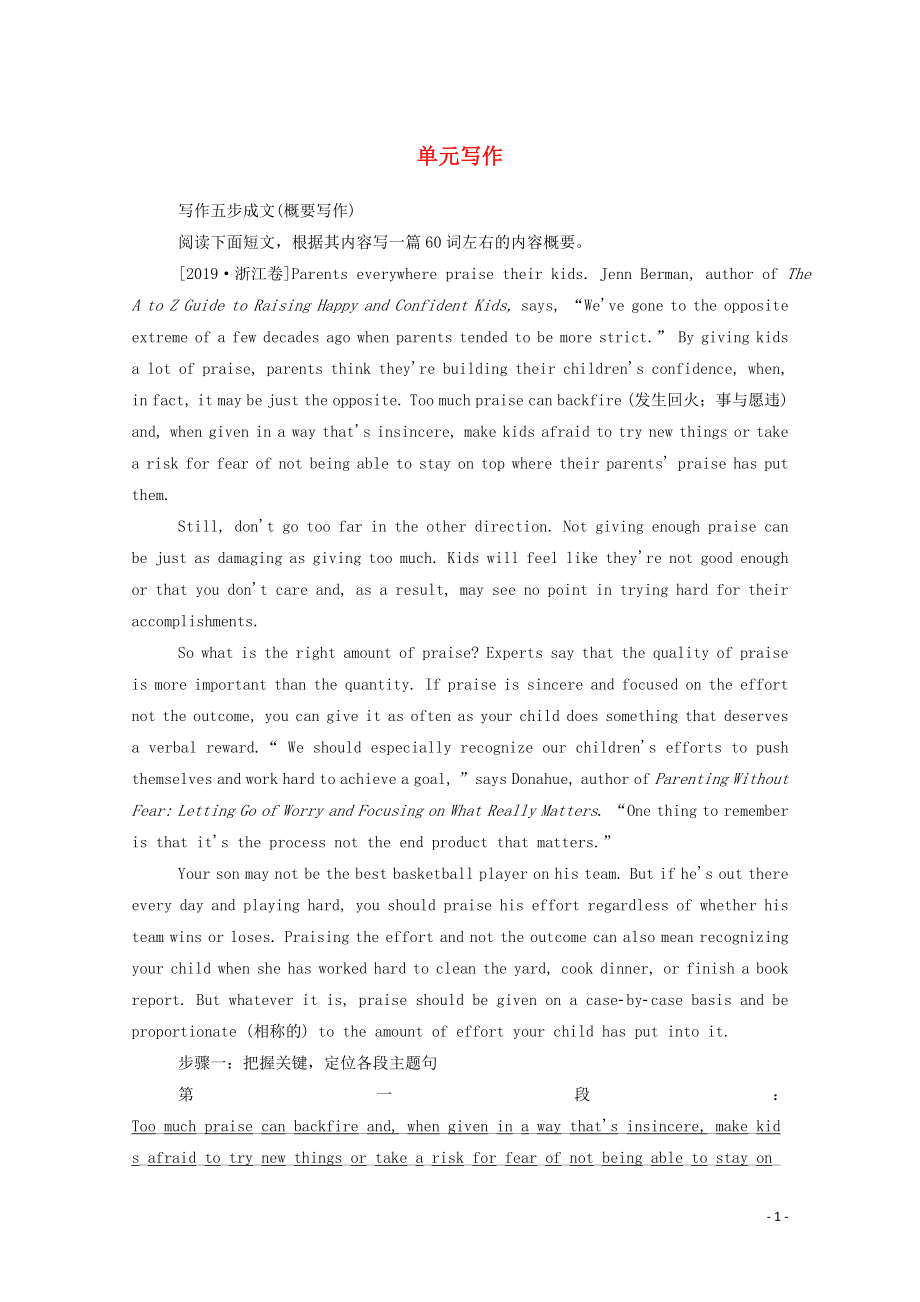《2019-2020學(xué)年新教材高中英語(yǔ) Unit 6 Earth first單元寫作練習(xí) 外研版必修第二冊(cè)》由會(huì)員分享�����,可在線閱讀�����,更多相關(guān)《2019-2020學(xué)年新教材高中英語(yǔ) Unit 6 Earth first單元寫作練習(xí) 外研版必修第二冊(cè)(3頁(yè)珍藏版)》請(qǐng)?jiān)谘b配圖網(wǎng)上搜索。
1�����、單元寫作
寫作五步成文(概要寫作)
閱讀下面短文�����,根據(jù)其內(nèi)容寫一篇60詞左右的內(nèi)容概要�����。
[2019·浙江卷]Parents everywhere praise their kids. Jenn Berman, author of The A to Z Guide to Raising Happy and Confident Kids, says, “We've gone to the opposite extreme of a few decades ago when parents tended to be more strict.” By giving kids a lot of
2�����、praise, parents think they're building their children's confidence, when, in fact, it may be just the opposite. Too much praise can backfire (發(fā)生回火�����;事與愿違) and, when given in a way that's insincere, make kids afraid to try new things or take a risk for fear of not being able to stay on top where their
3�����、parents' praise has put them.
Still, don't go too far in the other direction. Not giving enough praise can be just as damaging as giving too much. Kids will feel like they're not good enough or that you don't care and, as a result, may see no point in trying hard for their accomplishments.
So what
4�����、 is the right amount of praise? Experts say that the quality of praise is more important than the quantity. If praise is sincere and focused on the effort not the outcome, you can give it as often as your child does something that deserves a verbal reward.“ We should especially recognize our childre
5�����、n's efforts to push themselves and work hard to achieve a goal, ”says Donahue, author of Parenting Without Fear: Letting Go of Worry and Focusing on What Really Matters. “One thing to remember is that it's the process not the end product that matters.”
Your son may not be the best basketball player
6�����、 on his team. But if he's out there every day and playing hard, you should praise his effort regardless of whether his team wins or loses. Praising the effort and not the outcome can also mean recognizing your child when she has worked hard to clean the yard, cook dinner, or finish a book report. Bu
7�����、t whatever it is, praise should be given on a case-by-case basis and be proportionate (相稱的) to the amount of effort your child has put into it.
步驟一:把握關(guān)鍵�����,定位各段主題句
第一段:Too_much_praise_can_backfire_and,_when_given_in_a_way_that's_insincere,_make_kids_afraid_to_try_new_things_or_take_a_risk_for_fear_of
8�����、_not_being_able_to_stay_on_top_where_their_parents'_praise_has_put_them.
第二段:Not_giving_enough_praise_can_be_just_as_damaging_as_giving_too_much.
第三段:Experts_say_that_the_quality_of_praise_is_more_improtant_than_the_quantity.
第四段:But_whatever_it_is,_praise_should_be_given_on_a_case-by-case_basis_
9�����、and_be_proportionate_to_the_amount_of_effort_your_child_has_put_into_it.
步驟二:刪除細(xì)節(jié),提煉核心詞語(yǔ)
1.too much praise can backfire
2.a(chǎn)s damaging as giving too much
3.the quality of praise is more important than the quantity
4.the amount of effort your child has put into it
步驟三:尊重原文主旨�����,同義替換�����,變化表達(dá)方式
1.家長(zhǎng)表?yè)P(yáng)
10�����、孩子目的是提高孩子們的自信心�����。(主謂賓狀)
Parents_praise_their_children_to_promote_their_confidence.
2.表?yè)P(yáng)孩子太多會(huì)產(chǎn)生相反的結(jié)果�����。(lead to)
Praising_children_too_much_can_lead_to_an_opposite_effect.
3.表?yè)P(yáng)不足也有害�����,因?yàn)檫@使孩子失去動(dòng)力�����。(as引導(dǎo)的原因狀語(yǔ)從句)
Not_enough_praise_is_also_harmful_as_it_drives_kids_to_lose_motivation.
4.重要的是表?yè)P(yáng)的質(zhì)量而不是數(shù)量�����。(主謂
11�����、)
The_quality_of_praise_rather_than_the_quantity_matters.
5.表?yè)P(yáng)應(yīng)該真誠(chéng)并關(guān)注過(guò)程而不是結(jié)果�����。(and連接兩個(gè)謂語(yǔ))
Praise_should_be_sincere_and_concentrate_on_the_process_rather_than_the_result.
6.表?yè)P(yáng)提供了鼓勵(lì)和認(rèn)可�����。(主謂賓)
Praise_offers_encouragement_and_recognition.
7.你給出表?yè)P(yáng)的數(shù)量要基于他們的努力程度�����。(定語(yǔ)從句)
The_amount_of_praise_you_give_de
12、pends_on_how_hard_they_work.
步驟四:斟酌打磨——句式升級(jí)造亮點(diǎn)
1.把第1�����、2句變成but連接的并列句
Parents_praise_their_children_to_promote_their_confidence,_but_over-praise_may_lead_to_an_opposite_effect.
2.把第3句變成含which引導(dǎo)的限制性定語(yǔ)從句的復(fù)合句
Inadequate_praise_is_also_harmful_which_drives_kids_to_lose_motivation.
3.把第4句和第5句變成含主語(yǔ)從句和非
13�����、限制性定語(yǔ)從句的復(fù)合句
What_really_matters_is_the_quality_of_praise_rather_than_the_quantity,_which_should_be_sincere_and_concentrate_on_the_process_rather_than_the_result.
4.把第6句和第7句合成一個(gè)含though引導(dǎo)的讓步狀語(yǔ)從句的復(fù)合句
Though_praise_offers_encouragement_and_recognition,_the_amount_of_praise_you_give_depends_on_how_har
14�����、d_they_work.
步驟五:連句成文——邏輯銜接連成篇
Parents praise their children to promote their confidence, but over-praise may lead to an opposite effect. (要點(diǎn)1) However, inadequate praise is also harmful which drives kids to lose motivation. (要點(diǎn)2) Actually, what really matters is the quality of praise rather than the quantity, which should be sincere and concentrate on the process rather than the result. (要點(diǎn)3) Though praise offers encouragement and recognition, the amount of praise you give depends on how hard they work. (要點(diǎn)4) (72 words)
- 3 -
 2019-2020學(xué)年新教材高中英語(yǔ) Unit 6 Earth first單元寫作練習(xí) 外研版必修第二冊(cè)
2019-2020學(xué)年新教材高中英語(yǔ) Unit 6 Earth first單元寫作練習(xí) 外研版必修第二冊(cè)

